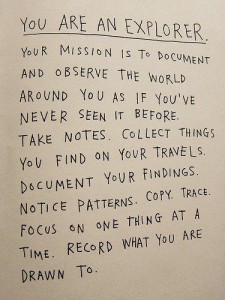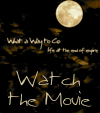 Which way to go next? It has taken me forever to get into the lab today, what with so many other things needing my attention. Now that I’m here, what fascinates? I thought I might follow up last week’s post with something called “So Who’s the Alien?”, which would question a basic assumption that underlies what I wrote last week. But I don’t have the heart or mind for that right now. My body is fairly filled with anxiety today, with fog and broken glass and phantom dogs and unpaid psychic bills and rotten leftovers in the emotional fridge. So what calls?
Which way to go next? It has taken me forever to get into the lab today, what with so many other things needing my attention. Now that I’m here, what fascinates? I thought I might follow up last week’s post with something called “So Who’s the Alien?”, which would question a basic assumption that underlies what I wrote last week. But I don’t have the heart or mind for that right now. My body is fairly filled with anxiety today, with fog and broken glass and phantom dogs and unpaid psychic bills and rotten leftovers in the emotional fridge. So what calls?
I think it’s time to post this video, which some of you have no doubt already seen. Take a few moments. Watch and listen and soak it up. The rest of this will follow from that experience.
What I want to say today is that it has taken me almost fifty-five years to be able to admit to myself what has felt forbidden to say: I did not get that. The care that baby got? The soft, gentle, loving, respectful regard? I did not get that. Not in the way I needed it. Not when I most needed it. Not from those from whom I most needed it. I did not get that. And not getting it has shaped my life more profoundly than I would ever have guessed.
This is not to say that I never got loving care, or that my parents didn’t “love” me, or that I was not supported as a child. I was well-fed and well-clothed, relatively free, and provided with the many toys and creature comforts a modern, American, middle-class lifestyle afforded these past fifty years. I was well-regarded by teachers and classmates. I was guided and advised and trained and encouraged in all the ways the culture expected I should be. It simply wasn’t enough. Or it wasn’t what I most needed. And somehow, a thick wire got soldiered into place, or perhaps a wire was broken and tossed away, and to this day, I must struggle to regard and value myself in the way that baby is being regarded and valued. This tender, nascent, unsolidified sense of self-regard interferes with my work. It creates misunderstandings and tripping points between myself and Sally. And it forms, in large part, the heavy, clumsy armor of anxiety and fear I don whenever I venture out into the world of “other people.” It can knock me to my knees any day of the week, leaving my body filled with clenched guts and tears piled up behind the lids. And as I’ve walked my healing path, it seems to have only intensified.
But it’s not really the pain and wounding I want to speak of right now. What I want to speak of is the process.
My family is all still alive, you see. Any of them, were they interested, could read this. And I imagine that, should they do so, they would likely conclude that my reason for writing the above is to blame my parents or my ex for my life, to extract some vague revenge, and/or to demand apology and restitution, all in the hopes that this would somehow “solve” my “problem,” and set me free. And none of those conclusions, I think, would be correct. I simply need to speak the reality of my life, and not pretend, even to myself, anything other than the truth of “what happened” and “what is so.”
Again, it’s the hiding, the pretense, that kills me.
I understand, you see, that the members of my family of origin were and are good and well-intentioned people doing their best in the world with what they were given. I understand that, in some real and fundamental way, my parents simply did not know what to do with me - their little alien - and that my family members, by and large, still don’t know what to do with me even now. I understand that my healing is my own work. And I understand that it is proceeding quite nicely. It’s just that this is what the “healed” version of me looks like. The wounds - amputations, mostly, rather than cuts and bruises - are simply a part of who I am now. The missing wires may always be missing. The wounds may always hurt a bit if I scuff them against a hard surface. But even if my wounds can trip me up on a daily basis, I can regain my footing on a daily basis as well. New wires can be soldiered into place. Prosthetic devices can help me function more fully. And there are people that can help me cross the street.
I don’t need my parents to go back in time and “fix the past.” They can no more do that than I can. I simply need to say what’s so for me, and not hide the truth from myself: something hurt me so deeply in my past that it still resonates throughout my mind, heart, body, and soul, like a gong still sounding fifty-five years after the mallet blow. When I see that baby in the bathwater, I get a feeling glimpse of what that was: there was some sort of care or regard or respect that I sorely needed as a child, and which I did not get. It has become my work, as an adult, and with Sally’s help, and others’, to find that regard, and to hold it as my own.
But I cannot find it until I first admit my forbidden truths to myself.
Now stop, and spend a moment getting in touch with your own feeling response to what I’ve so far written. Because I do this shit all the time, right? I reveal my hidden truths. My pains. My stumbling blocks. My feelings. And it never seems to get any easier. And part of the reason for that, I think, lies out there. With you.
Now, when I say “you,” I don’t know who I mean. You understand that, right? I don’t know who’s reading this. I don’t know to whom this applies. You’ll have to sort that out for yourselves. All I know is that I have a great many experiences that tell me that “you” are out there, and that while I have some response-ability in the matter of my own reactions and boundaries in our relationship together, so do “you.” I talk about my own part all the time. Today I’m talking about “you.” And “you” know who you are.
I said, in What a Way to Go, that “our feelings are the swiftest path back to our forgotten selves.” I said it because I believe it. I said it because it’s my experience. I said it because it had become clear to Sally and me, as we peered over the cliff of our present predicament, that the cultural train now heading toward that cliff is fueled, in great part, by the fact that we “civilized” humans have largely disconnected ourselves from the truth of our own feelings. We do not feel the death, pain, and misery our culture has wrought on the living world around us. We do not feel our own misery here on this planet, as we are born, live, and die inside of a cultural prison that does not serve us, neither our real needs nor our most precious dreams. We do not feel, we do not allow ourselves to feel, how deeply confused, wounded, and bereft we have been rendered in this culture. And because we do not feel these things, most of us, most of the time, seem unable to respond to our collective situation in a mature, adult, human way. We have forgotten who we are, what we want, why we are here, and where we are headed. And having forgotten ourselves, we are left largely powerless in the face of our unraveling world.
Sally and I are surely not the only ones to have come to this conclusion. But we may be some of the very few who have taken the work of reconnection as deeply as we have. Feeling what one is feeling seems like an obvious and important response to our current crisis. And speaking one’s feelings, as part of a larger community discussion regarding how to meet our predicament, has felt like our work for some time. But I gotta tell ya, I surely do understand why people do not and will not take this step. Venturing into “feeling out loud” can feel like stepping onto a bloody minefield. Or a courtroom…
You know how it goes. We all do, don’t we? You put a “bad” feeling out there - ”I’m afraid.” ”I’m in pain.” ”I’m filled with anxiety.” - and what do you hear in response? Well, Johnny, tell ‘em what they’ve won…
-”Cheer up, dude. It ain’t that bad.” Not only does this response convey that your feelings are not okay and that you need to stop showing them, they call into question their validity. It’s not so bad. You are mistaken about your own feelings.
-”Yeah, lots of people feel that way.” While an attempt is being made, perhaps, to let you know you’re not alone, there is often a dark undercurrent of “so why do you get to complain about it?”
-”You need to go outside and get some fresh air.” Advice of all kinds can convey, first, that your feelings are easily “solve-able,” and second, that you are simply not smart enough to have thought of the solution yourself, or that you’ve done little or nothing to solve things on your own and return to the right, proper, and culturally approved emotional state, which is Happy™. Advice operates on the assumption that there is something to be done to make your bad feelings go away, which conveys that it’s not okay for you to have these feelings in the first place.
-”Did you see Game of Thrones last night?” There are a million ways to divert and distract you when you “break the rules” and express a feeling. Jokes. Non-sequitors. Stories about somebody else’s situation. The message is that your expression of feeling is so unwelcome that they are just going to go on as if it hadn’t happened.
There are surely other items that belong on this list. I invite you to add them.
Now, many people, upon reading this, might call foul. “Surely people are just trying to help,” they might say. “They only want what’s best for you.” Perhaps those people are correct. I do observe that most people are trying to be and do good in the world, and are doing the best they can with what they have. But I’m going to go out on a limb here and say that all of these responses to your expression of “bad” feeling arise from the listener’s own discomfort with feeling, and are informed by deep cultural stories that no longer serve us. And I’m going to be so bold as to just say outright that, when somebody shares feelings of pain or grief or fear or anger or anxiety or helplessness or despair with you, maybe the only thing you need do in response, and perhaps the only thing that will ever really help, is to simply listen to them and reflect what they’ve said, so that they have the experience of having been heard. You don’t have to fix it. You don’t have to make it go away. You don’t have to make it better. You don’t have to know what to do. None of that is your job. Your job is simply to hear what they say, because having the truth of our lives seen and heard and known by other human beings lies at the heart of our healing and reconnection.
All that other stuff? Stop it. Just stop it. It does not help. And, in fact, it’s what makes people ever more hesitant to express out loud the truths of their lives. Stop with the deflection, the advice, the jokes, the cheering up. Stop, and learn to just listen and reflect. Let people’s feelings simply be what they are. Let your own feelings simply be what they are. Let the expression of feeling emerge into an ever safer environment. Dig up the mines and toss them away. Clear the courtroom. Create an open meadow into which feeling can venture out into the light. Join in as the community learns to tell itself the truth. And see where that leads.
I say it will lead to healing and connection. I say it will lead to reclamation and reconciliation, to growth and maturity and evolution. I say it will take us somewhere we want to go, even as the old forms, and the life of this world, unravel around us. Step onto that swiftest path. Re-member yourself. Help others remember themselves. Let us, in this time, tell the felt truth of our lives. We will never learn to reconnect with the Earth, I think, until we learn to reconnect with our own felt truth.
The truth of my life is that I did not get something that that baby got in that bathwater, and that this lack of regard or valuing has shaped my life in painful and surprising ways. I don’t need my family to fix that, or make me feel better. I simply need to say it, and to be listened to by my village as I say it. That pain has made me who I am today, and who I am is a wonderful man. I do not need that pain turned into Happy-ness™. I simply need to stop hiding it, so that I can put the energy it takes me to do so to other uses.
Ironic, perhaps, coming from a non-empath, but there it is. Please understand that this is learned behavior on my part, gathered painfully over the course of many years. I’m still learning it, perhaps now more than ever. True empaths probably don’t need to be told any of this. And know that I will have more to say to this. The opposite of a great truth is usually another great truth, as Neils Bohr said. I want to remember that. For now, this will suffice.
Time to turn out the lights.
Pax, T
PS: I’ll be traveling in the next week or two, so will be unable to hang out in my lab. I invite you to visit your own labs and see what fascinates you. Perhaps you have a guest blog inside of you, just waiting to pop out?






